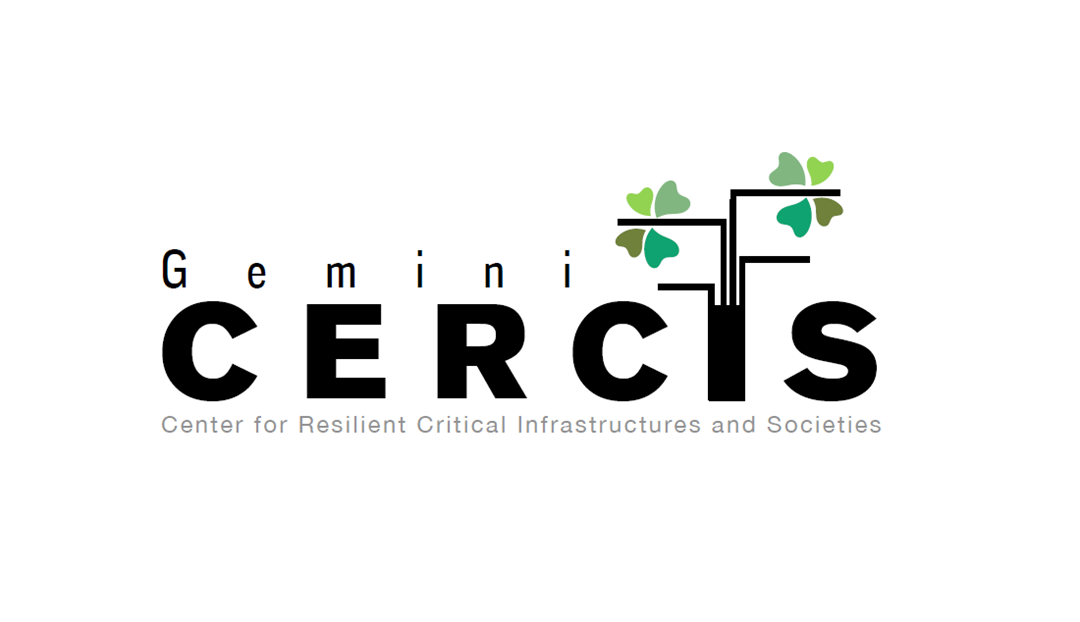
Gemini centre - Resilient critical infrastructures and societies - CERCIS

About CERCIS
What is in it for you?
The centre offers research-based solutions to design, operate and manage complex sociotechnical systems and organisations. Our work deals with revealing and enhancing resilience performance at micro-level (complex socio technical systems), meso (organisations) and macro (society). CERCIS activities are implemented around three focus areas resilient societies, resilient infrastructures and resilient digital societies.
Why resilience?
The concept of “resilience” has gained extreme popularity in many scientific areas such as societal, organisational, urban, city, personal, human, socio-technical and disaster research. As a field of research, resilience addresses the ability of systems, organisations and society to continue operations both under expected and unexpected situations (adapted from Hollnagel). This is a response to the increased of complexity, interdependencies across critical infrastructures and uncertainty posed by the emergence of disruptive technological innovations, climate change and changes in geopolitical structures.
Our work is transdisciplinary ….
Resilience is a transdisciplinary area of research that integrates social (e.g. sociology, psychology), formal (e.g. computer sciences) and applied sciences (e.g. engineering and technology). The centre will work at the intersection of technology (critical infrastructures, tools, ICT systems), formal structures (governance, organisation, responsibilities) and informal structures (social capital, trust, collaboration, power alliances). It will conduct transdisciplinary research and it will not conduct research based on a single discipline.
The centre will coordinate two arenas of cooperation a generic arena concerning advances in theory (societal, organisational and systems) and application arena (aviation, maritime, oil and gas, communication, safety and cybersecurity, autonomy, digitalization, smart cities).
Management team
Lead: Ivonne Herrera (NTNU Samfunnsforskning AS)
Co-lead: Kay Fjørtoft (SINTEF Ocean)
Co-lead: Martina Ragosta (SINTEF Digital)
Co-lead: Ivan Depina (NTNU)
Partners and contacts
Norwegian University of Science and Technology (NTNU)
Faculty of Economics and Management
Faculty of Social and Educational Sciences
Faculty of Information Technology and Electrical Engineering
Faculty of Engineering
NTNU Samfunssforskning AS (NTNU Social Research)
SINTEF
SINTEF Digital
- Department of Software Engineering, Safety and Security
- Cybersecurity: Per Håkon Meland
- Resilience: Tor Olav Grøtan, Matthieu Branlat, Martina Ragosta
- Department of Technology Management
- Contact: Trine Stene
SINTEF Ocean
- Energy and Transport
- Contact: Kay Fjørtoft
- Aquaculture Technology
- Contact: Siri Holen
SINTEF Energy Research
- Energy systems
- Contact: Gerd Kjølle
SINTEF Community
- Infrastructures
- Contact: Rita Ugarelli
A network of networks
We actively contribute to the following associations and communities:
- Norway Community of Users Civil Security for Societies (NoCoU)
- Resilience Engineering Association
- European Safety and Reliability Association ESRA – Technical comittee on resilience engineering
- EC DG Home, Community for European Research and Innovation for Security (CERIS)
- Thematic Area: Resilient Infrastructures
- Thematic Area: Disaster Resilient Societies
The Centre actively supports:
- De Regionale Sikkerhetsdagene (every year targeting security practitioners)
- Resilience Engineering Symposium (every second year)